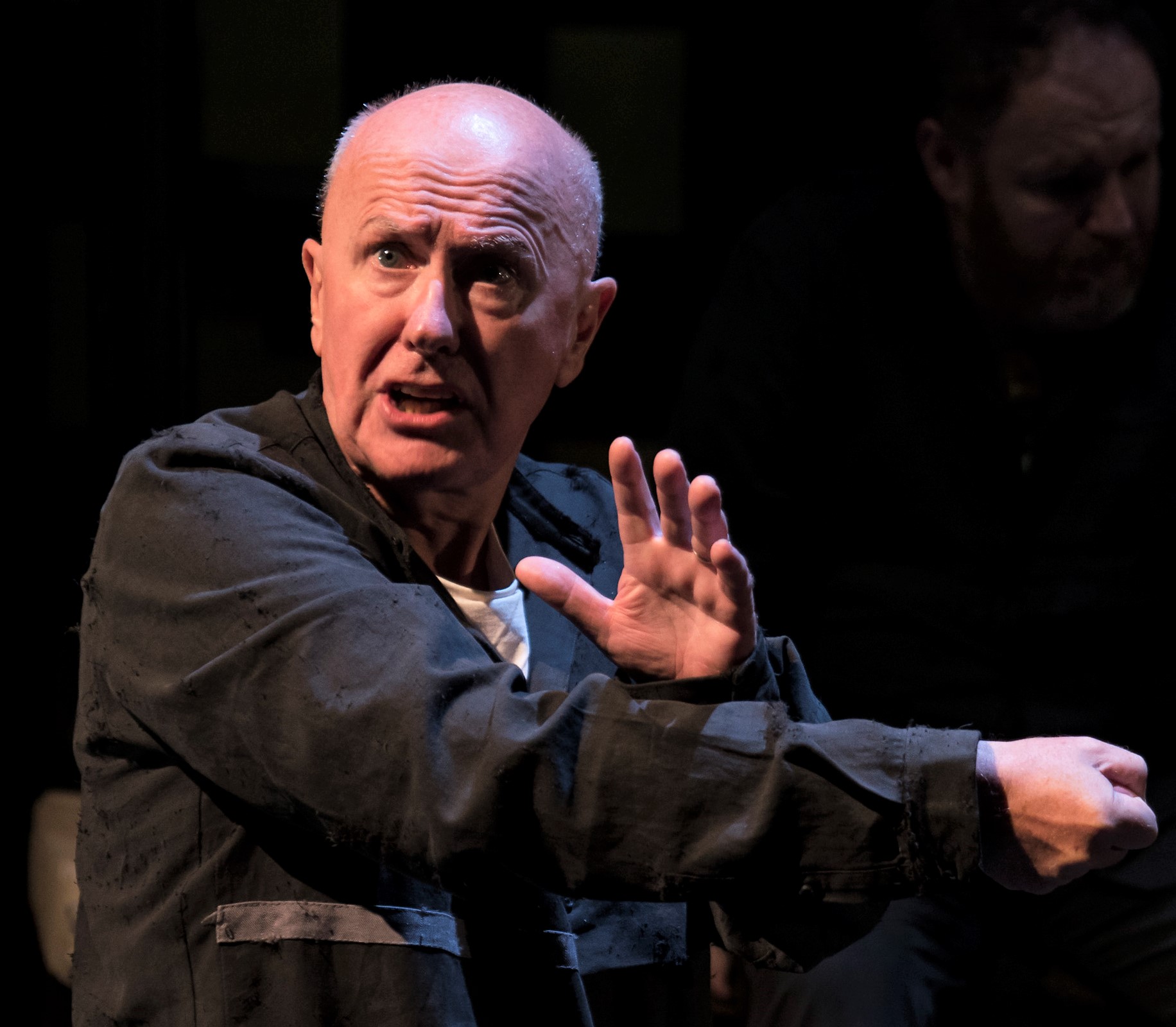In Ireland’s County Cork there are apparently many ghosts. Nasty ghosts. KING (an acronym for Keep Ignoring Nasty Ghosts) posits that ghosts of the past have a central role in the way we live our present—and future. Fishamble, a Dublin-based theater showcase for new Irish plays, has produced this work, which features a solo performance by Pat Kinevane, a veteran associate of the company. Director Jim Cullerton has shaped it into a powerful but enigmatic and often disturbing reflection on obsession, mental illness, England’s domination of Ireland and its empire, and one man’s attempt to grapple with a litany of wrongs, both past and present.
On Blueberry Hill
Sebastian Barry, the Irish playwright who made a theatrical splash with his 1995 play The Steward of Christendom, has since then become as renowned for his novels (The Whereabouts of Eneas McNulty, Days Without End, A Long Long Way) and only sporadically returned to the theater. On Blueberry Hill, a presentation of Origin’s 1st Irish Festival, is less a traditional play than two intertwined monologues—like The Pride of Parnell Street, a 2007 play from Barry’s hand that was presented here by the same company, Fishamble, or Brian Friel’s Faith Healer—but it is riveting.
Niall Buggy plays Christy in Sebastian Barry’s On Blueberry Hill. Top: Buggy (seated) with David Ganly as PJ, his cellmate.
Although inherently lacking the excitement of actors facing off in conflict, monologues in the right hands can be thrilling. Barry dresses his in poetic imagery that recalls the glories of J. M. Synge’s The Playboy of the Western World. Indeed, the Christian name of Synge’s hero, Christy Mahon, has been borrowed for one of the two characters, cellmates and killers. Director Jim Culleton’s production puts Barry’s gift for storytelling on full display, as the author teases out their tragic history in bits and pieces and keeps the audience guessing at why and how they became cellmates, and whether there is any connection between them.
The first speaker is PJ (David Ganly), a plump man early in middle age who is in prison (Sabine Dargent provides the minimal set, bunk beds supported by a cylindrical metal frame) for a crime that may not quite have been one. He recalls his childhood and his struggling mother in the 1960s: “We hated the English but that didn’t mean we loved ourselves,” he says, and Ganly stammers slightly as PJ; he often has downcast eyes as he describes the events that brought him to prison, but then sin weighs particularly hard on him because he was a seminarian. He is a man whose soul trembles with guilt.
While in seminary, he made friends with a younger man, Peadar, “a perfectly normal young Irish boy except he was shining with beauty. … With an accent on him that would mash spuds.” They fell in love, but on an outing to a nearby island their lives take a horrific turn in a split second that leads to PJ’s incarceration.
Meanwhile, in Christy’s monologues, we learn of his hardscrabble life. The son of a tinker who was killed in a knife fight, Christy has been the mainstay of his family since he was young. He’s daring, or perhaps foolhardy but lucky, as he takes on operating construction machinery with which he has no experience:
And the big thing on a building site is, if they ask you can you do something, you always say yes, or I always did, and one time it was ‘Can you drive a dozer?’ and I said yes, sure I had the bit of practice on a pal’s motorcycle in Ireland….
Ganly as the anguished PJ. Photographs by Patrick Redmond.
The combination of life-threatening recklessness and comic ego proves winning in Niall Buggy’s performance. He is an angry, forceful man, but in 20 years he has had no contact with his wife or children. If PJ agonizes constantly over his fatal act, Christy accepts his punishment more stoically. But he has happy memories of meeting his wife at a dance where “On Blueberry Hill” was played and of their wedding:
[H]aving the feed at the Pierre Hotel, and us all coming out into the late twilight of a summer’s night, happy as larks with the skinful of beer and burnt chicken, oh yes, and the wide bay lying there before us like the bedclothes of God.
Both Ganly and Christy conjure up the others in their lives, the richness of their freedom, both in happiness and pain. Says Christy:
Mayhem. Anger. You can do anything with anger. I mean, the bit of the gospels that I really like, when PJ is reading to me, as he does sometimes in the night-times, is the time JC goes ape-shit over the moneylenders. Some of the holy bits go over my head, but that bit I understand. I understand it perfectly.
And they conjure a third character, the guard McAllister, who puts them in a cell together as a cruel joke. He never appears, but he’s a crucial component of the story, and Barry is a master storyteller—as are the two actors and their characters. As they draw toward the end of their lives, one feels sorrow at the loss of two good men, their crimes notwithstanding. It’s well worth the visit.
The Fishamble production of On Blueberry Hill runs through Feb. 3 as part of the Origins 1st Irish Festival at 59E59 Theaters (59 E. 59th St.). Evening performances are at 7:15 p.m. Tuesday through Saturday; matinees are at 2:15 p.m. Saturday and Sunday. For tickets and information, call the box office at (646) 892-7999 from noon to 6 p.m. or visit 59e59.org.










